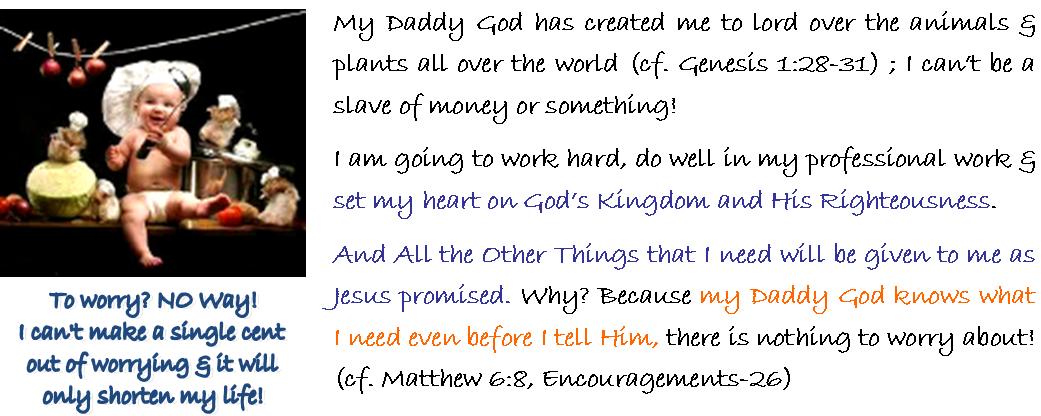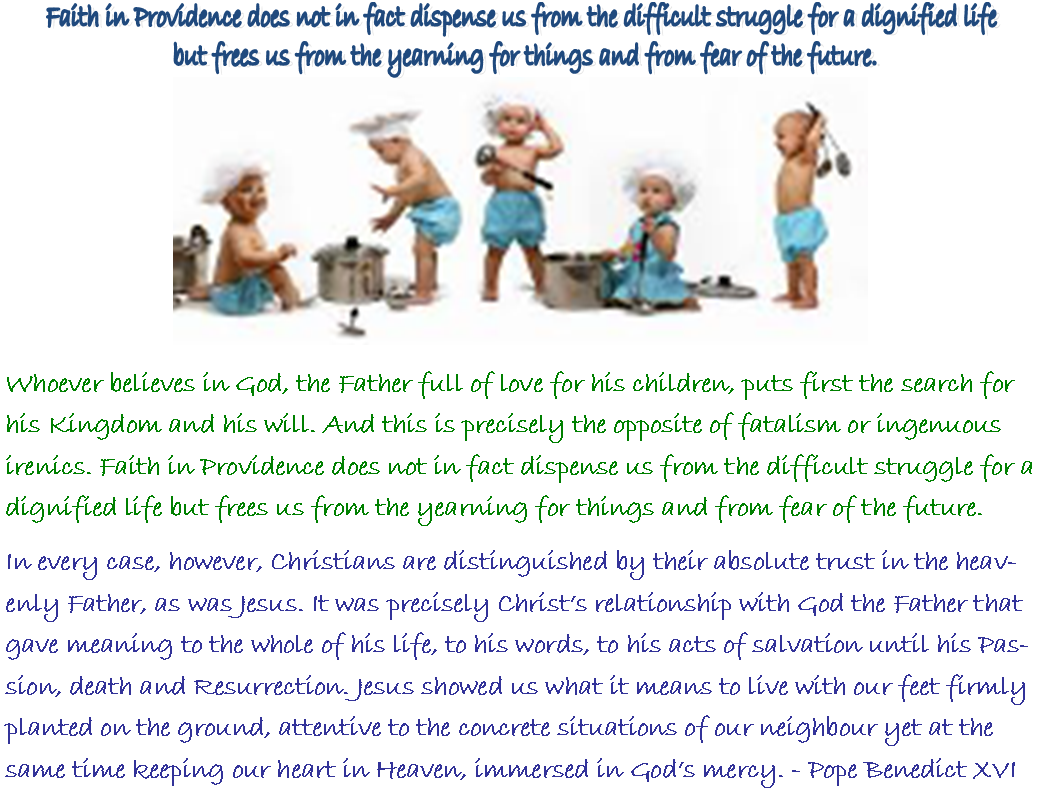|
134 |

|
First reading: Extracted from the prophet Isaiah 49:14-15 Zion was saying, ‘The Lord has abandoned me, the Lord has forgotten me.’ Does a woman forget her baby at the breast, or fail to cherish the son of her womb? Yet even if these forget, I will never forget you.
See the love letter from my Daddy God to me: Isaiah 49 > Encouragements-117. |

|
Responsorial Psalm 62:2-3, 6-9 In God alone is my soul at rest.
In God alone is my soul at rest; my help comes from him. He alone is my rock, my stronghold, my fortress: I stand firm.
In God alone be at rest, my soul; for my hope comes from him. He alone is my rock, my stronghold, my fortress: I stand firm.
In God is my safety and glory, the rock of my strength. Take refuge in God, all you people. Trust him at all times. Pour out your hearts before him. |

|
2nd Reading: Extracted from the first letter of Saint Paul to the Corinthians: 1 Corinthians 4:1-5 People must think of us as Christ’s servants, stewards entrusted with the mysteries of God. What is expected of stewards is that each one should be found worthy of his trust. Not that it makes the slightest difference to me whether you, or indeed any human tribunal, find me worthy or not. I will not even pass judgement on myself. True, my conscience does not reproach me at all, but that does not prove that I am acquitted: the Lord alone is my judge. There must be no passing of premature judgement. Leave that until the Lord comes; he will light up all that is hidden in the dark and reveal the secret intentions of men’s hearts. Then will be the time for each one to have whatever praise he deserves, from God. |

|
Gospel Reading: Extracted from the holy Gospel according to Matthew 6:24-34: Jesus said to his disciples: ‘No one can be the slave of two masters: he will either hate the first and love the second, or treat the first with respect and the second with scorn. You cannot be the slave both of God and of money. ‘That is why I am telling you not to worry about your life and what you are to eat, nor about your body and how you are to clothe it. Surely life means more than food, and the body more than clothing! Look at the birds in the sky. They do not sow or reap or gather into barns; yet your heavenly Father feeds them. Are you not worth much more than they are? Can any of you, for all his worrying, add one single cubit to his span of life? And why worry about clothing? Think of the flowers growing in the fields; they never have to work or spin; yet I assure you that not even Solomon in all his regalia was robed like one of these. Now if that is how God clothes the grass in the field which is there today and thrown into the furnace tomorrow, will he not much more look after you, you men of little faith? So do not worry; do not say, “What are we to eat? What are we to drink? How are we to be clothed?” It is the pagans who set their hearts on all these things. Your heavenly Father knows you need them all. Set your hearts on his kingdom first, and on his righteousness, and all these other things will be given you as well. So do not worry about tomorrow: tomorrow will take care of itself. Each day has enough trouble of its own.’
Should I be obedient to Christ, not to worry & not to be a slave to money? This is what the Modern Saint Padre Pio said: “Where there is no obedience there is no virtue, where there is no virtue there is no good, where there is no good there is no love, where there is no love, there is no God, and where there is no God there is no Paradise.”
Sharing: It was the Eighth Sunday in Ordinary Time on 2 March 2014.
The Readings that were read in the Eucharistic Celebrations all over the world on the same day are shown above.
We have extracted the Homilies Pope Benedict XVI & Pope Francis I based on the aforesaid Readings to share with you, so that you could similarly be encouraged: |

|
BENEDICT XVI ANGELUS St Peter's Square (Video)
Dear Brothers and Sisters,
One of the most moving words of Sacred Scripture rings out in today’s Liturgy. The Holy Spirit has given it to us through the pen of the so-called “Second Isaiah”. To console Jerusalem, broken by misfortunes, he says: “Can a woman forget her sucking child, that she should have no compassion on the son of her womb? Even these may forget, yet I will not forget you” (Isaiah 49:15). This invitation to trust in God’s steadfast love is juxtaposed with the equally evocative passage from the Gospel of Matthew in which Jesus urges his disciples to trust in the Providence of the heavenly Father, who feeds the birds of the air and clothes the lilies of the field and knows all our needs (cf. 6:24-34).
This is what the Teacher says: “Therefore do not be anxious, saying ‘what shall we eat?’ or ‘what shall we wear?’. For the Gentiles seek all these things and your heavenly Father knows that you need them all”.
In the face of the situations of so many people, near and far, who live in wretchedness, Jesus’ discourse might appear hardly realistic, if not evasive. In fact, the Lord wants to make people understand clearly that it is impossible to serve two masters: God and mammon [riches]. Whoever believes in God, the Father full of love for his children, puts first the search for his Kingdom and his will. And this is precisely the opposite of fatalism or ingenuous irenics. Faith in Providence does not in fact dispense us from the difficult struggle for a dignified life but frees us from the yearning for things and from fear of the future.
It is clear that although Jesus’ teaching remains ever true and applicable for all it is practised in different ways according to the different vocations: a Franciscan friar will be able to follow it more radically while a father of a family must bear in mind his proper duties to his wife and children. In every case, however, Christians are distinguished by their absolute trust in the heavenly Father, as was Jesus. It was precisely Christ’s relationship with God the Father that gave meaning to the whole of his life, to his words, to his acts of salvation until his Passion, death and Resurrection. Jesus showed us what it means to live with our feet firmly planted on the ground, attentive to the concrete situations of our neighbour yet at the same time keeping our heart in Heaven, immersed in God’s mercy.
Dear friends, in the light of the word of God of this Sunday I ask you to invoke the Virgin Mary with the title “Mother of divine Providence”. To her let us entrust our life, the journey of the Church and the events of history. In particular, let us invoke her intercession so that we may all learn to live in accordance with a simpler and more modest style, in daily hard work and with respect for creation, which God has entrusted to us for safekeeping.
-----------------------------------------------------------------------------------
After the Angelus:
I welcome all the English-speaking pilgrims and visitors gathered for this Angelus prayer. In today’s Gospel Jesus invites us to trust in the provident care of our heavenly Father and to seek first his Kingdom and its righteousness. May his words inspire us to see all things in their true perspective and to live our lives in joyful faith and sure hope in God’s promises. Upon you and your families I invoke the Lord’s abundant blessings!
I wish you all a good Sunday.
Acknowledgment: We thank the Vatican Publisher for allowing us to publish the Homily of Pope Benedict XVI, so that it could be accessed by more people all over the world; as a source of God’s encouragements to all of us. 9 March 2014
POPE FRANCIS ANGELUS Saint Peter's Square
Dear Brothers and Sisters, Good morning!
At the centre of this Sunday’s Liturgy we find one of the most reassuring truths: Divine Providence. The Prophet Isaiah presents it as the image of maternal love full of tenderness, and thus says: “Can a woman forget her sucking child, that she should have no compassion on the son of her womb? Even these may forget, yet I will not forget you” (49:15). How beautiful is this! God does not forget us, not one of us! Everyone by name and surname. He loves us and doesn’t forget. What a beautiful thought.... This invitation to trust in God finds a parallel on a page of Matthew’s Gospel: “Look at the birds of the air”, Jesus says, “they neither sow nor reap nor gather into barns, and yet your heavenly Father feeds them.... Consider the lilies of the field, how they grow: they neither toil nor spin; yet I tell you, even Solomon in all his glory was not arrayed like one of these” (Matthew 6:26, 28-29).
However, thinking of the many people who live in precarious conditions, or even in a poverty offensive to their dignity, these words of Jesus could seem abstract, if not illusory. But actually they are relevant, now more than ever! They remind us that you cannot serve two masters: God and wealth. As long as everyone seeks to accumulate for themselves, there will never be justice. We must take heed of this! As long as everyone seeks to accumulate for themselves, there will be no justice. Instead, by entrusting ourselves to God’s providence, and seeking his Kingdom together, no one will lack the necessary means to live with dignity.
A heart troubled by the desire for possessions is a heart full of desire for possessions, but empty of God. That is why Jesus frequently warned the rich, because they greatly risk placing their security in the goods of this world, and security, the final security, is in God. In a heart possessed by wealth, there isn’t much room for faith: everything is involved with wealth, there is no room for faith. If, however, one gives God his rightful place, that is first place, then his love leads one to share even one’s wealth, to set it at the service of projects of solidarity and development, as so many examples demonstrate, even recent ones, in the history of the Church. And like this God’s Providence comes through our service to others, our sharing with others. If each of us accumulates not for ourselves alone but for the service of others, in this case, in this act of solidarity, the Providence of God is made visible. If, however, one accumulates only for oneself, what will happen when one is called by God? No one can take his riches with him, because — as you know — the shroud has no pockets! It is better to share, for we can take with us to Heaven only what we have shared with others.
Continue next page ... |